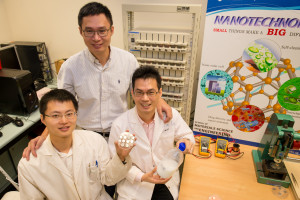
Researchers at Nanyang Technological University have developed ultra-fast charging batteries that last 20 years.
Credit: Nanyang Technological University
If you’re tired of spending more time charging your phone than actually using it, a team of researchers out of Singapore have some good news for you. The group from Nanyang Technological University (NTU) have developed an ultra-fast charging battery – so fast that it can be recharged up to 70 percent in only two minutes.
When comparing this new discovery to the already existing lithium-ion batteries, the new generation has a lifespan of over 20 years – approximately 10 times more than the current lithium-ion battery. Further, each of the existing li-ion’s cycles takes two to four hours to charge, which is significantly more than the new generation’s two minute charge time.
The development will be of particular benefit to the industry of electric vehicles, where people are often put off by the long recharge times and limited battery life. The researchers at NTU believe that drivers of electric vehicles could save tens of thousands on battery replacement costs and will be able to charge their cars in just ten minutes, all in thanks to the new ultra-fast charging battery.
This from NTU:
In the new NTU-developed battery, the traditional graphite used for the anode (negative pole) in lithium-ion batteries is replaced with a new gel material made from titanium dioxide. Titanium dioxide is an abundant, cheap and safe material found in soil. It is commonly used as a food additive or in sunscreen lotions to absorb harmful ultraviolet rays. Naturally found in spherical shape, the NTU team has found a way to transform the titanium dioxide into tiny nanotubes, which is a thousand times thinner than the diameter of a human hair. This speeds up the chemical reactions taking place in the new battery, allowing for super-fast charging.
If you’re interested in battery research, take a look at what our Battery Division has to offer.
You can also explore the vast amount of research ECS carries on the technological and scientific breakthroughs in the field of battery by browsing through our digital library or taking a look at this past issue of Interface.

